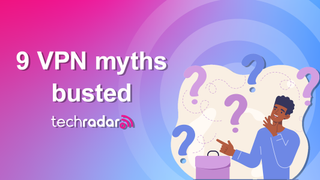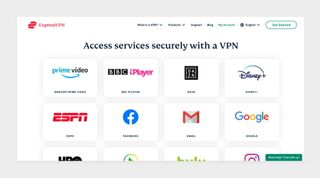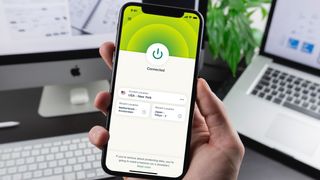9 VPN myths busted - here's the truth
Separating VPN fact from VPN fiction.

More and more people are using virtual private networks (VPNs) to boost their digital privacy—and that's partially because they've become so commercialized in recent years. You might be able to get started with a VPN in a few clicks, but there are a lot of myths swirling about out there that are potentially putting off new users.
I've been reviewing VPNs for 3 years and, trust me, I've heard some seriously wacky rumors about what the best VPNs can and can't do. Keep reading, and I'll demystify some of the most common VPN myths.
1. I don't need a VPN; I have nothing to hide
Okay, so, you might be wondering why you need a VPN to protect your privacy if you don't do anything dodgy online. I hear this argument a lot, and it's a good question to ask.
I've covered how to use a VPN in my jargon-free guide.
It all boils down to your right to digital privacy—you shouldn't have anyone (like an ISP or network admin) looking over your shoulder as you browse the web. It doesn't matter if you only check Facebook now and then or if you're, as the kids say, chronically online. It's your business—but advertisers, unfortunately, would disagree. They gobble up your data in order to build profiles about you that they use to display creepy personalized ads, and brokers happily pass your data on to the highest bidder.
With a VPN, you're preventing yourself from becoming a product, and ensuring that whatever you choose to do online stays private.
2. Only criminals use VPNs
This is one of the most popular misconceptions I run into. VPNs can be used by dodgy sorts to get up to no good (by torrenting copyrighted material, hacking, and that kind of thing), but that's not their sole purpose. I don't condone any of those activities—there are tons of legal uses of VPNs that everyone can enjoy.
Protecting your privacy is the main one, of course, and a VPN can put a stop to third-party snooping. That means you can go about your day-to-day browsing without your ISP, network admin, the sites you visit, or even your government looking over your shoulder. This is critical for people living in countries where digital censorship is everywhere, preventing them from connecting with friends and family on social media, accessing news sites, and enjoying the same streaming platforms we take for granted.
Are you a pro? Subscribe to our newsletter
Sign up to the TechRadar Pro newsletter to get all the top news, opinion, features and guidance your business needs to succeed!
Basically, secure VPNs are used by anyone who wants a more free, more accessible, and more secure internet experience.
3. VPNs are only for unblocking streaming sites
Admittedly, VPNs are a very good way of checking out content in other parts of the world—whether that’s the US Netflix library, Hulu, BBC iPlayer, or about a hundred other services. You'll often hear YouTube affiliates emphasizing this use case, too, because it's generally more marketable than the privacy-boosting features.
However, even the best streaming VPNs have plenty of other uses:
- Spoofing your location to check out deals and sales from other regions
- Accessing your banking app when overseas the same way you would at home
- Staying secure when joining public Wi-Fi hotspots that are unsecure, fake, or potentially hacked
- Stopping DDoS attacks in their tracks by masking your original IP address
- Changing the IP address of IoT devices (including Ring doorbells), encrypting the data they send and receive, and preventing them from being hacked

4. VPNs are too complicated for everyday users
It's easy to get overwhelmed by all the technical aspects of a VPN—things like encryption protocols, cryptography, and even geo-spoofing. They're the sort of concepts most people associate with dedicated cybersecurity experts—and can deter new users from checking out a VPN.
The good news is that you don’t need to know exactly how a VPN works to use one. It's the same way that you don’t need to know exactly what your mobile phone is doing (or how it's doing it) to enjoy sending texts, taking pictures, getting frustrated at that one Candy Crush level…
If you're a tech-savvy VPN user, you can go rifling through your VPN's settings and check out the advanced features, including options like split tunneling, kill switches and different VPN protocols. This is all optional, however, since most of today's top services are ready to go as soon as you've installed the app. All you need to do is connect to a server and wait a second or two, then carry on with your browsing while the VPN does all the hard work (and encrypts your data).

5. VPNs slow you down
Unfortunately, this one is true—but only because your VPN is going the extra mile to secure your browsing sessions. Connect to a VPN and your internet traffic gets encrypted and sent to a VPN server, where it's then decrypted and sent on its way to its destination. It's a long journey and one that your traffic doesn’t usually have to make when you're not using a VPN.
Want to know how we put VPNs to the test? Our VPN testing methodology page has all the details.
The slowdown shouldn't be too noticeable, however, depending on your VPN configuration and the location of the server you’re connecting to. Join a server on another continent and your traffic has to travel the distance—so, to maximize your speed, it’s better to stick to servers in and around your current location.
There are some instances where a fast VPN can actually help speed up your connection. ISPs monitor your traffic and can slow you to a crawl if they think you’re using too much bandwidth. You might be streaming, torrenting, or gaming and notice, suddenly, that your speeds have plummed—that's ISP throttling in action. Fortunately, by encrypting your traffic, a VPN prevents your ISP from figuring out what you're doing and deciding to hit the breaks.
6. VPNs make you 100% anonymous
Things would be much simpler if this was the case, wouldn’t they? Unfortunately, while VPNs can certainly improve your digital security, they can't guarantee protection from every threat out there.
Some folks think that, because a VPN assigns you a new IP address when you connect to a server, this makes them totally anonymous. It's an easy mistake to make—after all, this new IP is what’ll help you bypass geo-restrictions and fool sites into thinking you’re somewhere else.
However, the sites you log into will still know where you are, and social media cookies, trackers, and ads can build up an invasive profile of your browsing habits, too. You'll also need to be wary of putting personal information online yourself—seeing as a VPN can’t help you, there.
8. No-logs VPNs don't keep any logs
The confusion surrounding this myth is, usually, down to the wording of a VPN's privacy policy—and if you've ever scrolled through one of them, you'll know what I mean. They're often long, complicated, and heavy on the jargon. Some claim that a VPN abides by a 'zero-logs' policy when, in reality, that's not the truth.
Most services keep some logs in order to improve the service but otherwise abstain from IP logging and device logging. You will find, however, that some VPNs keep aggregated and/or anonymized logs—which cover things like how long you've been connected to a server and which server you're using. Why? Well, it helps the provider troubleshoot issues (for instance, if users are suddenly flocking to one server).
I've reviewed a lot of VPNs, and once upon a time, I found a service that claimed to stick to a no-logs policy—which was true.

The VPN stated that by accepting its policy you'd also "accept the Privacy Policy of [its] advertising partner" and, as you might've guessed, the advertising partner in question had no qualms about gobbling up user IP addresses.

Obviously, this defeats the purpose of using a VPN, but the provider wasn't technically lying by claiming not to keep logs. How's that for shady?
8. VPNs are all the same
If you're new to the world of VPNs, you might be wondering what sets VPN providers apart when they all, essentially, do the same thing. Sure, VPNs all encrypt your traffic via a secure tunnel to boost your digital security, but they're not all made equal.
I've vetted dozens of VPNs in my time, and it's clear that there's a huge gap in quality between today's top dogs and the shadier services. The best providers prioritize your privacy with clear privacy policies verified by independent auditors while, on the flip side, the worst services will take someone else's apps and slap their own branding on them. They won't even write their own privacy policy—usually, they just copy and paste one from somewhere else.
Untrustworthy VPNs also make claims and promises that they have no intention of living up to. These are the providers that plaster the best and fastest all over their site—and then have sluggish apps that barely function. My favorite VPNs are more modest, and actually invest in their service to ensure that they're offering cutting-edge features (like double VPN and ad-blocking tools) as well as awesome speeds.
Then, there are free VPNs—and the old adage of "if it's too good to be true, it usually is" remains relevant. Some premium VPNs offer a free tier as a sort of sample platter—a taste of what the premium option can do—and will try to get you to upgrade by saddling you with restrictions, like bandwidth caps and a limited number of servers. Other free VPNs are, well, scams. It costs money to run a VPN, and these providers make it by collecting your identifiable data and selling it to the highest bidder. Obviously, this is the last thing you want your VPN to be doing.
9. VPNs don't work in China
China's Great Firewall has a fearsome (and warranted) reputation—it's an insidious means of censorship that prevents folks in China from accessing a huge number of sites, services, and apps. It's also possible for VPN traffic to be distinguished from regular traffic, which means that some VPNs just won't work in the country.
If you want to get around the Great Firewall (and other blocks, bans, and censorship), you’re going to need a VPN with reliable obfuscation (cloaking). These services can make your encrypted VPN traffic look like normal traffic.
The good news is that there are a handful of solid China VPNs. ExpressVPN is one of these providers and has a ton of security tools and nearby servers in places like Hong Kong, Japan, and Taiwan, meaning that the people in China have a secure bridge to the web beyond the Great Firewall.
ExpressVPN's team constantly monitors the network, ensuring that accessibility in China remains high and that the country's censorship efforts never have them on the back foot. In fact, a lot of ExpressVPN's engineers live in Hong Kong, meaning they have a finger on the pulse of impending hiccups that could disrupt the service in China.
Disclaimer
We test and review VPN services in the context of legal recreational uses. For example:
1. Accessing a service from another country (subject to the terms and conditions of that service).
2. Protecting your online security and strengthening your online privacy when abroad.
We do not support or condone the illegal or malicious use of VPN services. Consuming pirated content that is paid-for is neither endorsed nor approved by Future Publishing.

River is a Tech Software Editor and VPN expert at TechRadar. They’re on-hand to keep VPN and cybersecurity content up-to-date and accurate. When they’re not helping readers find the best VPNs around (and the best deals), River can be found in close proximity to their PS5 or being pushed about the countryside by the lovely Welsh weather.